
UNAIDS Global Advocate for Zero Discrimination
Annie Lennox UNAIDS Goodwill Ambassador GWA music advocacy


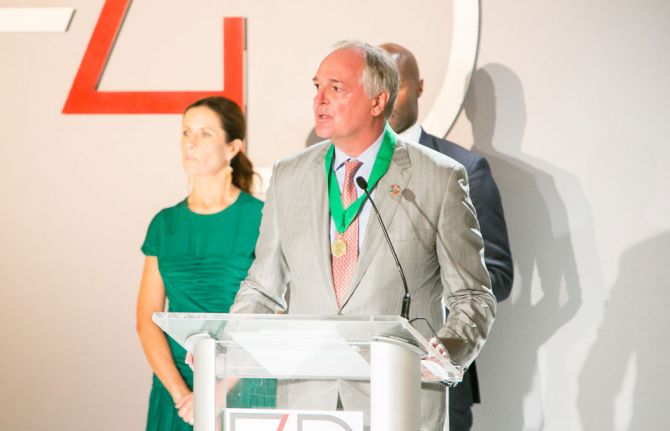
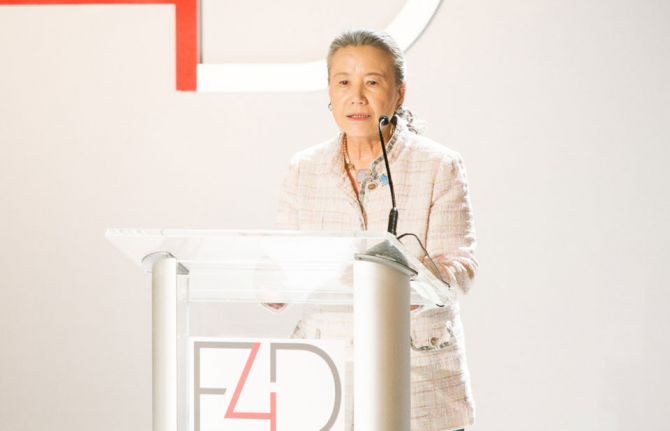
22 September 2016
22 September 2016 22 September 2016UNAIDS International Goodwill Ambassador Annie Lennox received the Fashion 4 Development Award on 21 September in recognition of her outstanding work as a campaigner for women’s rights and HIV issues.
The award was made at the Fashion 4 Development’s Annual First Ladies Luncheon, which is held during the United Nations General Assembly week in New York, United States of America, to celebrate the unprecedented cooperation between diplomacy and fashion for the greater good of women and children worldwide.
Annie Lennox has been actively engaged in responding to HIV since 2003, when she first met Nelson Mandela and personally witnessed how the AIDS pandemic was affecting countries and communities.
After seeing how the epidemic disproportionally affects women and children, she has dedicated her efforts to help women empower other women. In 2008, Ms Lennox founded the Circle, a group of influential women who have come together to use their profiles, ideas, skills and resources to connect with women living in poverty around the world deprived of their human rights.
In her role as a UNAIDS Goodwill Ambassador, Annie Lennox has undertaken numerous high-profile speaking roles and field missions and has been a prominent voice for the implementation of the Global Plan towards the elimination of new HIV infections among children by 2015 and keeping their mothers alive, which has led to a reduction in new HIV infections among children globally.
Fashion 4 Development is a private sector global platform founded by Evie Evangelou in 2011 and supports the Sustainable Development Goals by promoting social change through harnessing the power of the fashion industry and facilitating platforms for exchange and engagement.
“I am personally so grateful for all the opportunities I have been given, by the sacrifices of so many courageous women of past and present generations. That is why I am a passionate advocate for the rights of girls and women in the developing world.”
This award is very well-deserved and is testament to Annie Lennox's longstanding commitment to these issues. She is a powerful and passionate advocate who works tirelessly to empower women and girls. UNAIDS is proud that she is our Goodwill Ambassador.



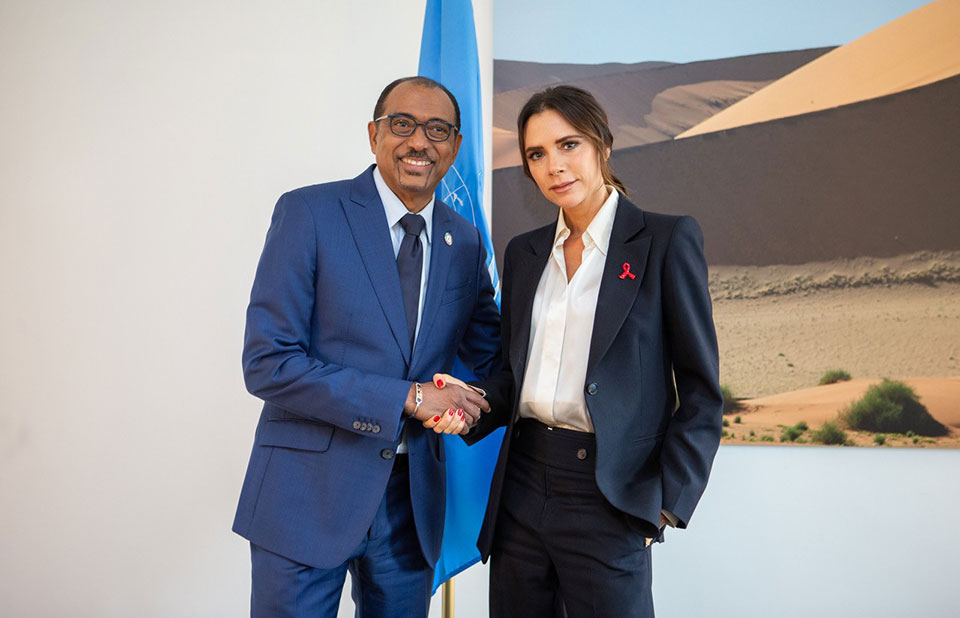





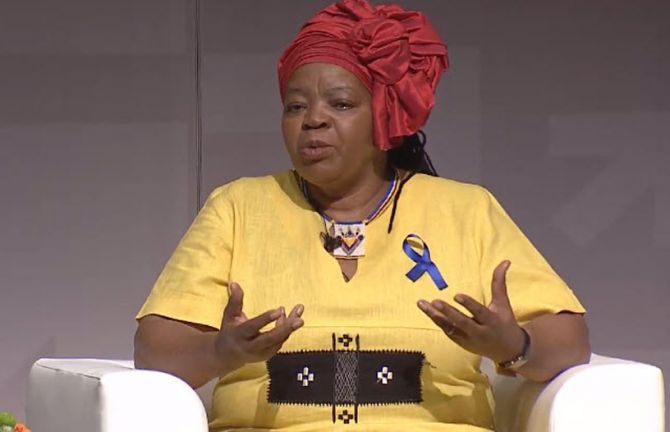
19 May 2016
19 May 2016 19 May 2016On 17 May, UNAIDS and the World Health Organization (WHO) convened a panel discussion on the progress made and challenges in eliminating new HIV infections among children and ensuring the health and well-being of mothers. UNAIDS and WHO joined together at the Women Deliver conference, taking place in Copenhagen, Denmark, to amplify the message that access to HIV services and promoting sexual and reproductive health and rights are inextricably linked.
The session highlighted the successes to date of the global HIV response for women and children, including the 77% coverage of pregnant women living with HIV in 2014 receiving antiretroviral medicines to stop transmission of HIV to their child, an increase from the 37% coverage in 2009. The right of women to have children, the right to information on how to protect themselves from HIV and the right to HIV treatment were reinforced by the panellists. How to provide HIV treatment as part of the Sustainable Development Goals and in the context of the changing political and funding environments affecting donor priorities was also discussed.
The Director of the UNAIDS Regional Support Team for Eastern and Southern Africa, Sheila Tlou, opened the panel discussion, which was moderated by Geeta Rao Gupta, Deputy Executive Director of the United Nations Children’s Fund. UNAIDS Goodwill Ambassador Annie Lennox spoke at the event, which also featured Annah Sango, a young mother and youth activist living with HIV, Kenly Sikwese, an advocate and father living with HIV, and Felicitas Zawaira of the WHO regional office in Brazzaville, Congo.
“The world has a golden opportunity to remove an agonizing experience for many women—the risk of transmitting HIV to a child. By working together and ensuring access to antiretroviral medicines, we can empower women with one more tool towards achieving their full reproductive health rights.”
“We have come a long way and made historic progress. But AIDS is not over. The Sustainable Development Goals provide an important opportunity to renew our commitment and to finish the unfinished business of protecting women, children and families from HIV, and providing treatment to all who need it.”

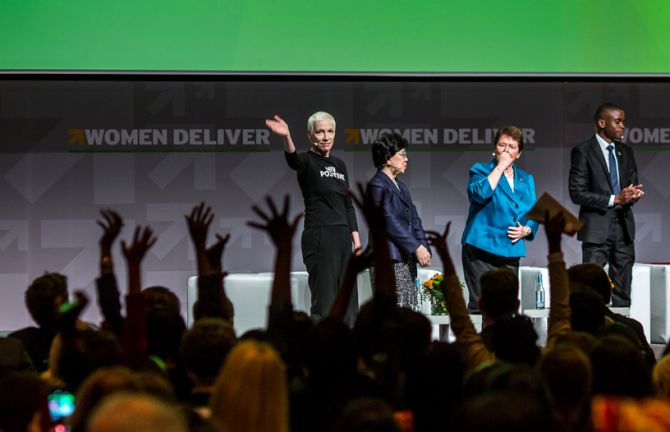
17 May 2016
17 May 2016 17 May 2016UNAIDS International Goodwill Ambassador Annie Lennox galvanized participants at the opening of the Women Deliver conference, which is taking place in Copenhagen, Denmark, from 16 to 19 May. Ms Lennox said that women had to break down the structures that cemented gender inequality and end all forms of gender-based violence. Her speech electrified the more than 5000 delegates taking part in the conference, which is the world’s largest global conference on the health, rights, and well-being of girls and women to take place in the past decade.
The 2016 Women Deliver conference is being held under the theme of “Implement the Sustainable Development Goals so they matter most for girls and women.” The conference has a special focus on health, and in particular maternal, sexual and reproductive health and rights. Other themes include gender equality, education, the environment and economic empowerment.
The agenda of Women Deliver is central to the UNAIDS Fast-Track approach which calls for action on women’s empowerment and the advancement of sexual and reproductive health and rights in order to end the AIDS epidemic.
Other speakers at the opening ceremony included Her Royal Highness Princess Mary of Denmark, Jill Sheffield, the Chief Executive Officer and President of Women Deliver, Babatunde Osotimehin, Executive Director of the United Nations Population Fund, Gro Harlem Brundtland, the former Prime Minister of Norway, Margaret Chan, Director-General of the World Health Organization, and the journalist, human rights activist and Nobel Prize laureate, Tawakkol Karman.
“Ending the AIDS epidemic requires a unified response in tackling the deepest roots of social injustice. To succeed, we must break down structures of gender inequality, we must dismantle notions of patriarchy and we must end all forms of gender-based violence.”

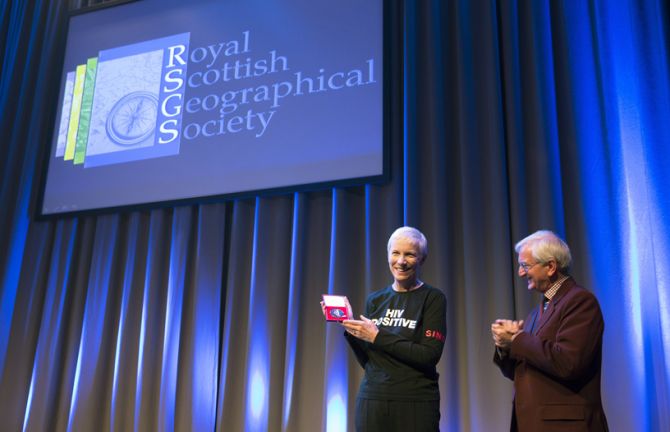
21 March 2016
21 March 2016 21 March 2016At a special event at the Royal Scottish Geographical Society, UNAIDS International Goodwill Ambassador Annie Lennox has been awarded the prestigious Livingstone Medal for her outstanding contribution to humanitarian work, including her work in the response to HIV.
For more than two decades, Ms Lennox has used her platform to respond to the stigma and discrimination associated with HIV, spoken out for the most vulnerable people in society and been a powerful voice for the empowerment of women and girls. She has undertaken numerous visits to affected communities in Africa and supports many nongovernmental organizations, such as mothers2mothers, which campaigns to end HIV among children. Ms Lennox has been an International Goodwill Ambassador for UNAIDS since 2010.
Awarded since 1901 and named after the nineteenth century British explorer David Livingstone, former recipients of the Livingstone Medal include the American astronaut Neil Armstrong, the New Zealand mountaineer Sir Edmund Hillary and the former Irish President and United Nations High Commissioner for Human Rights, Mary Robinson.
“I’m truly honoured to receive such a significant and historical award as the Livingstone Medal. There have been numerous social and medical transformations since David Livingstone’s lifetime, yet there is still so much more to do before we can see the end of the AIDS epidemic, which has affected the lives of millions of men, women and children across every region of sub-Saharan Africa. My contribution has been small, but my dream would be to see the end of AIDS in the not too distant future.”
“I congratulate my dear sister Annie on this well-deserved recognition. I am proud that her crucial work has been recognized in this way. Annie's voice and activism have contributed so much to the AIDS response and to the results we are seeing today, including the Global Plan towards the elimination of new HIV infections among children by 2015 and keeping their mothers alive.”

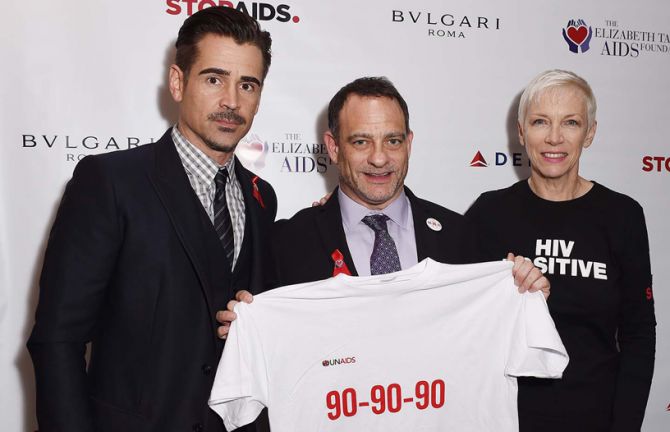
13 October 2015
13 October 2015 13 October 2015The Elizabeth Taylor AIDS Foundation, STOPAIDS and actor Colin Farrell hosted a gathering at the Elizabeth Taylor Grit and Glamour exhibition at the Getty Images Gallery in London, United Kingdom, to announce their commitment to the UNAIDS Fast-Track approach to achieve the 90–90–90 treatment target in Malawi’s Mulanje District.
The Mulanje District has been particularly affected by HIV and despite the efforts of health-care workers and the Malawi Ministry of Health, health services in the district remain weak. According to The Elizabeth Taylor AIDS Foundation, adult HIV prevalence is around 17% and approximately 70 000 people in the district are living with HIV, making it one of the most affected regions in the world.
Recognizing the need to bring health services closer to people in remote areas of Malawi, The Elizabeth Taylor AIDS Foundation has been working in the Mulanje District since 2004 and has established seven mobile health clinics that provide HIV prevention and testing services.
Every day, the seven clinics rotate to a new location. The Elizabeth Taylor AIDS Foundation estimates that an average of 1000 patients were seen every day in 2014—40% were children under the age of five. Furthermore, it estimates that every one of the 900 000 residents in Malawi’s Phalombe and Mulanje Districts now lives within an hour’s walk to life-sustaining health-care services—an important achievement, especially given the country’s challenging road infrastructure.
At the event in London, The Elizabeth Taylor AIDS Foundation called for more partners to join and form a new wave of mutually reinforcing strategies to achieve the UNAIDS 90–90–90 treatment target in Mulanje District under the leadership of the District Health Office.
The Elizabeth Taylor Grit and Glamour photo exhibition served as the backdrop at the event, featuring images that spanned decades of her career as an actress and activist. Actor Colin Farrell opened the evening by welcoming guests and honouring the late Elizabeth Taylor.
Speakers included Lord McConnell of Glenscorrodale, First Minister of Scotland 2001–2007, and architect of the Scotland–Malawi Co-operation Agreement, and Joel Goldman, Managing Director, of The Elizabeth Taylor AIDS Foundation, who urged support for additional funding to scale up HIV prevention, testing and treatment programmes in the Mulanje District.
Singer/songwriter and UNAIDS International Goodwill Ambassador Annie Lennox closed the event, thanking the organizations in the room for their commitment to achieving the UNAIDS 90–90–90 treatment target in Malawi.
“The tide of the AIDS epidemic is turning. In Malawi and other countries, deaths are down, prevalence is falling, and new infections are reducing. But now it’s time for a knockout punch—and we all need to work together to achieve it.”
“AIDS is the leading cause of death among young women and adolescent girls in sub-Saharan Africa. Last year alone, 2 million people were newly infected with HIV—over a million people died and a quarter of a million babies were infected. As a woman, mother and global citizen, I am appalled by these horrific facts and as the years go by, I still don’t honestly think that the world has fully grasped the scale of the devastation AIDS has wreaked upon the lives of women, girls and young people in general.”
“Activism, optimism and dedication have brought people living with HIV to the centre of the response, given a voice to the voiceless and enabled 15 million people to access life-saving treatment. I am inspired to see so many countries and partners, like The Elizabeth Taylor Foundation, uniting around the UNAIDS Fast-Track Targets to ensure that together we end the AIDS epidemic by 2030.”

27 February 2025

24 February 2025

20 February 2025
First Lady of South Africa Tobeka Madiba Zuma
UNAIDS Special Advocate for the Health of Women, Youth and Children